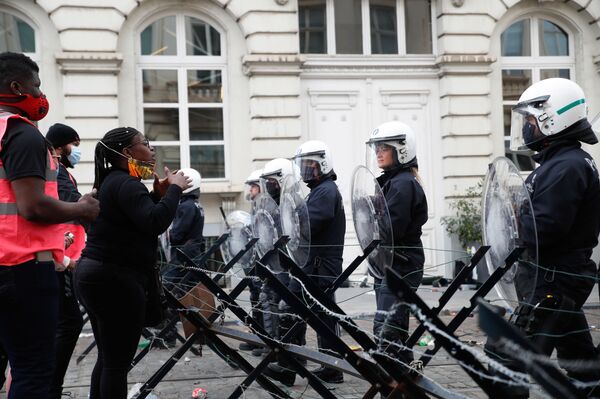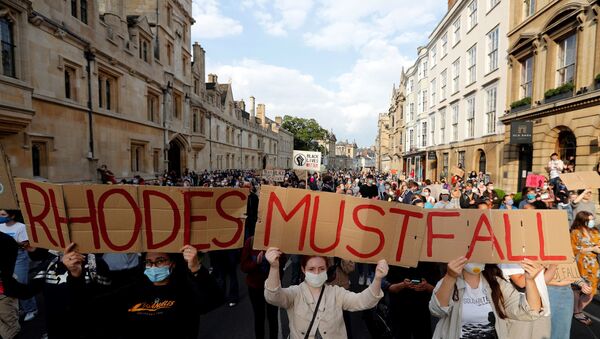It's a mistake to think humanity is always progressing.
The headline of the Sunday paper in front of me says 'Knifeman in Park Terror Attack- three are feared dead, and two fight for life in hospital'. It refers to the brutal murder of three innocent people sitting in a park in Reading after a suspected terror attack with a Libyan refugee arrested. Would you have seen that on the front of a British Sunday newspaper in 1970?
Everywhere you look in 2020 there is fear and loathing. The US is in the midst of a vicious culture war, which threatens to tear the whole country apart - the UK appears to be following suit. Instead of 'friendly persuasion' being used to try and reach out to those who think differently, 'hate the haters' seems to be the slogan of the day. I have never known political/public discourse to be this toxic.
And this is even before we get on to the chilling attempts to introduce anti-human 'social distancing' as a 'New Normal' under the cover of Covid-19 and the ever-increasing Internet censorship of dissident opinions.
It's all pretty depressing and enough to drive anyone to despair. But we can get out of this- if we accept that much of what has happened in recent years has been a regression.
Ask yourself this simple question: for all the hi-tech advances do you think people in 'advanced' western nations are happier now than they were 50 years ago?
Research in 2015 found that 38% of American adults said they were 'very happy' in the early 1970s, compared to 32% in the 2010s.
In the UK a survey showed that national happiness peaked in 1976 and it's been downhill all the way since.
It's likely the happiness figure will plummet further in 2020. What a contrast the start of the 2020s has been compared to the start of the 1970s. Of course, there were still problems in 1970, but fifty years ago there was genuine optimism about the direction of travel.
There was detente between East and West. Ordinary people across the world had never had it so good. There was full employment and the distribution of wealth had never been so equal. There were great leisure opportunities, and no shortage of places to meet up and mingle.
It was an exciting time to be alive because everything seemed possible. If Man could make it to the Moon, what else couldn't he do?
We may not have appreciated it at the time, but the early 1970s was a truly golden era.
The vibrant popular culture of the time reflected this optimism.
If there was one song from the summer of 1970 which encapsulated the zeitgeist it was 'Everything is Beautiful' by the American artist Ray Stevens. It topped the US charts for two weeks and was a big hit in Britain too. With its positive and upbeat Christian message and joyous celebration of life in all its glorious variety, the song would be sneered at by media 'hipsters' today. Yet in these most downbeat of times, we could all do well to listen to its lyrics.
Like other compositions of the time, 'Everything is Beautiful' stressed what unites us not what divides us. 'We shouldn't care about the length of his hair or the colour of his skin... don't worry about what shows from without but the love that lies within'.
The anti-racism the song espouses- which advocates not caring about skin colour- is the antithesis of today's ID politics, which makes someone's skin colour, religion, race, sexuality, gender or ethnicity, of paramount importance. Anti-racism has itself morphed into a form of racism. Fighting hate and prejudice has become hateful and prejudiced.
Stevens' song also contains the lyrics: 'We must not close our minds; we must let our thoughts be free'. Is that really happening in 2020, when tribal 'group-think' dominates? The line taken by 90% of commentators and pundits on any issue can be safely predicted beforehand.

Another hit from 1970 we can learn from today is Melting Pot, by Blue Mink. This plea for racial harmony- 'what we need is a great big melting pot, big enough to take the world, and all it's got', reached number three in the UK charts in the first week of the new decade. Blue Mink were a very talented mixed-race group, who like The Equals, did so much to break down barriers. Yet in 2019 their statement AGAINST racial intolerance was banned by a UK radio station after ONE listener complained to OfCom for its 'offensive lyrics', which used an old-fashioned term to describe people from China.
The key point that Blue Mink were opposing racial prejudice- and used the term in that context-doesn't seem to have made any difference.
Modern political correctness means that even if you make an artistic statement against prejudice if you use one word which is deemed 'unacceptable', even if it is used ironically, you're in the sin bin. Your record will be taken off air, your books burned. That's how intolerant the new 'tolerance' has become.
How can any artist operate in such a repressive climate, where certain people are hanging on every word to try and find something to be 'outraged' about?
No wonder why so much of today's art, from new television drama, to pop music and literature, is so sterile. Everyone is scared of giving 'offence', however inadvertently, to one group or another. Everyone feels obliged to comply with the dominant orthodoxy. Let's admit it: Free speech no longer exists- if people aren't censored, they self-censor.
Yet in this age of p.c. conformity, there is more division than ever. The solidarity that used to exist between people, before the ID politics-pushing neoliberals got going, has all but evaporated.
Don't think this any of this happens by accident. Ask yourself who benefits from shifting the debate from contemporary 'regime-change' imperialism to historical statues. Or from the obsessive focus on witch-hunting alleged 'racists' of past and present at the expense of bringing people of all races, classes and ethnicities together today.
ID politics, culture wars and overblown fears about Covid-19 serve the interests of the pro-globalist power elites, who love to see us fighting amongst ourselves,(and living in a permanent state of fear), but it most certainly doesn't serve the greater cause of humanity.
It's time we wised up to what is happening and saw the bigger picture.
We can 'free our minds' by listening to some early 70s music.
As the appropriately named Brotherhood of Man put in in their big hit from 1970, 'United we stand, divided we fall'. A lyric we need to remember each and every day in 2020.
Follow Neil Clark @NeilClark66 and @MightyMagyar
Support his Libel and Legal Enforcement Fund





